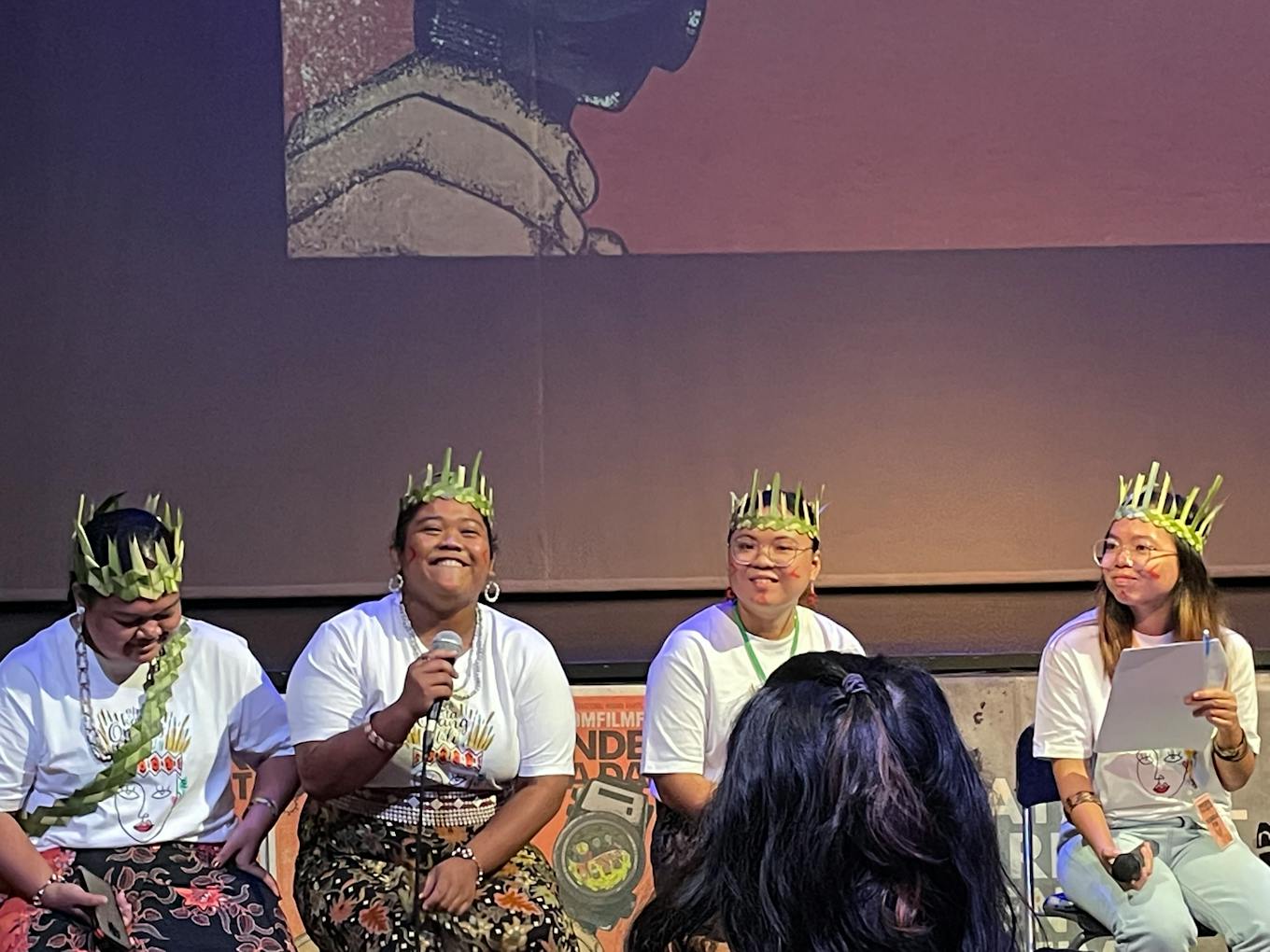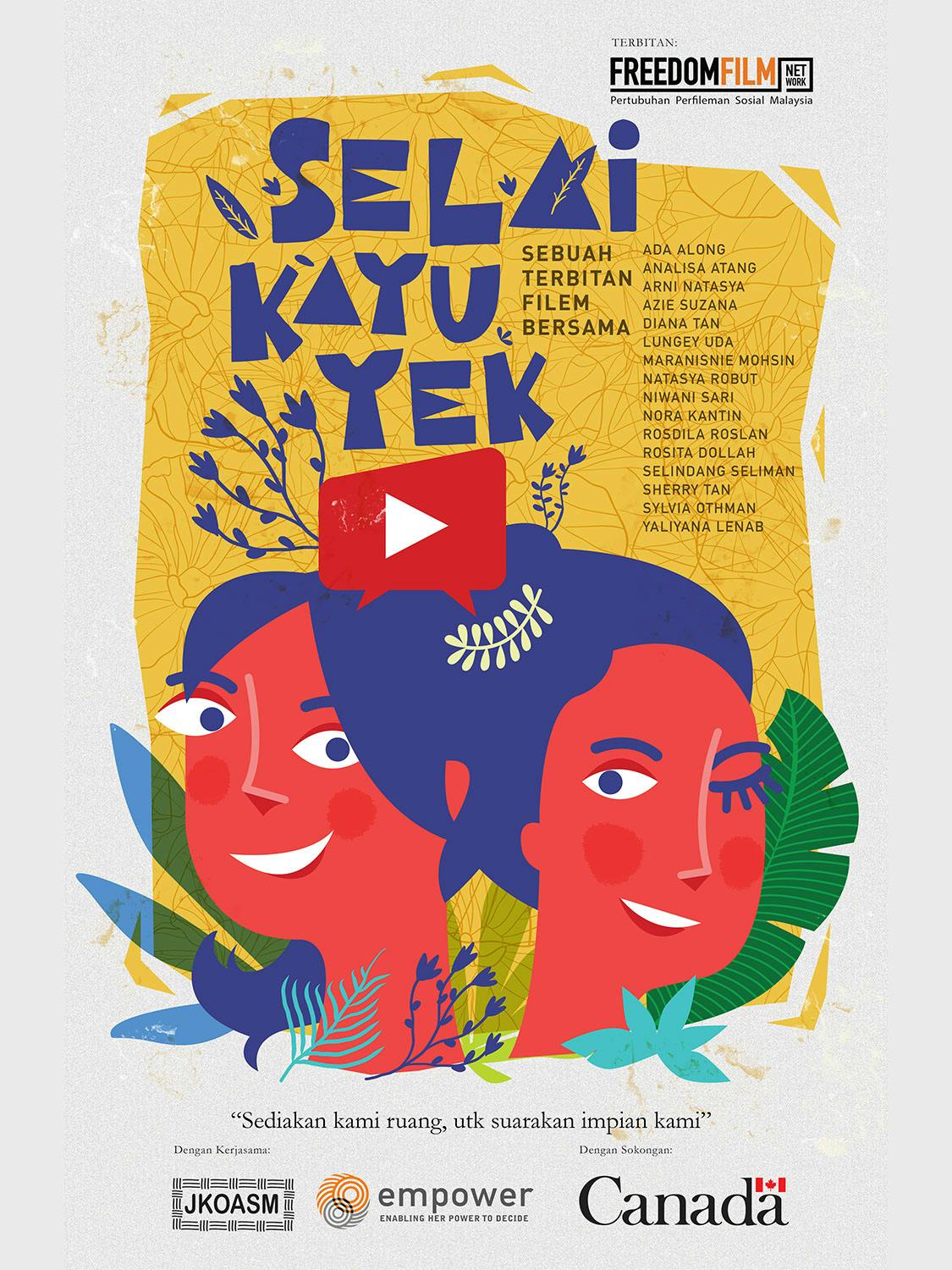Stories told by Indigenous peoples about the struggles they face protecting their lands and customs usually do not evoke laughter. But in a small auditorium in Petaling Jaya, Kuala Lumpur last September, giggles filled the room as two young Orang Asli women filmmakers provided comic relief alongside an illuminating glimpse into their worlds on screen.
The film being shown was Selai Kayu Yek, which translated means Roots of My Land. It tells the tale of two young Orang Asli women – one a famous YouTuber and another a farmer living on her family’s ancestral land – who look past their differences to find a common voice with which to defend their rights. The Orang Asli are the Indigenous peoples of Peninsular Malaysia.
The film mirrors the journey of its producers themselves. Young Orang Asli women between the ages of 18 and 30 were instrumental in creating, planning, filming and producing three short films under the Apa Kata Wanita Orang Asli (Amplifying the Voices of Young Orang Asli Women) banner. These films have been screened at multiple locations throughout Malaysia and internationally, including schools, Orang Asli villages and the Freedom Film Festival, organised annually by the not-for-profit documentary filmmaking body Freedom Film Network.
“Although the [content] is about our traditions and culture, we interspersed that with things people would like to see,” said Eliana Tan, one of the young filmmakers producing videos for the group’s YouTube channel.
“But the humor and jokes don’t mean that we weren’t able to get across our message. To me, the message we wanted to send out was conveyed, but we made the character funnier to attract the interest of viewers,” she told Eco-Business.

The young Orang Asli filmmakers of the Apa Kata Wanita Orang Asli programme speak about their experiences at the Freedom Film Festival in September 2022. Eliana Tan (far right) was one of the young women spoke to Eco-Business on a podcast. Image: Samantha Ho/ Eco-Business
Eco-Business spoke to Eliana, fellow Orang Asli filmmaker Yaliyana Lenab who goes by Yana, as well as Freedom Film Network co-founder and project lead for the Apa Kata Wanita Orang Asli project Brenda Danker in our first bilingual podcast, recorded in English and Bahasa Melayu.
Note: The English segments in the podcast are at 00:00, 2:08, 7:00 and 20:05.
Here is a translated snippet of the conversation:
Why did you join Apa Kata Wanita Orang Asli? What were you hoping for, and why is it important to you?
Eliana: At first I didn’t care about the issues that were happening in my community. I thought I should get a good education, which would lead to me getting a good job. But once I joined the Freedom Film Network’s project, I realised that there are no platforms that raise Orang Asli issues from within our own communities.
I believe that by joining this organised movement, we will be able to change the narrative about the Orang Asli people in the future, whether it is through books or film screenings. To me, this project is very important because as part of a minority group [in Malaysia], film is an effective platform for highlighting the issues that we face.
What existing narratives did you feel weren’t accurate about the issues faced by the Orang Asli community?
Eliana: People used to say that education-wise, we are already at the same level as other races [in Malaysia]. I don’t believe that, because we witness and experience for ourselves that there is a lack of education in our communities, that there are many challenges when it comes to securing access to education. We have been let down by that narrative.

A poster for the short film Selai Kayu Yek, which was produced by young Orang Asli women through the Apa Kata Wanita Orang Asli project organised by Freedom Film Network. Image: Freedom Film Network
Can you tell us more about the short films that were produced? What issues were highlighted, and why?
Brenda: We focused on rights – human rights, rights of the Indigenous peoples and gender rights.
The women then explored themes that they felt were important to them in story lab sessions. And they decided to tell the stories about their identity as Orang Asli. The started doing research, went back to their villages and spoke to their elders and community members. Three short films were produced, and other than Selai Kayu Yek, these included Klinik Ku Hutan (The Forest, My Clinic) and Rahsia Rimba (Secret Guardians of the Forest). The films focus on the rights of the Orang Asli to their ancestral land. They are also about traditional knowledge of the community and their identity. We wanted to emphasise that the Orang Asli community have a very special bond with the forest. Without the forest, they are unable to practise their traditions.
Why is it important for the voices of Orang Asli youths to be heard, especially those of young women?
Yana: Everyone needs to be aware that we are also able to contribute ideas to ignite change in the Orang Asli communities.
At the moment, there is also a lack of representation by women – we don’t have the rights to voice our own opinions. Men are usually at the forefront [of these stories]. But women too can come forward and champion causes, although some people assume that women cannot do these things. As young women that are still full of energy, we should come forward.
What was it like working on the short films?
Yana: It was very challenging. We went to villages without electricity and mobile signal. Many did not have access to water. The risks were high, but we tried our best to produce the films.
Even before the films were released, we were already facing criticism from some groups in the Orang Asli community. But my friends and I were enthusiastic about making the films a success. Although there were people who criticised and tried to put us down, we were still determined to produce the films.
What were the criticisms about?
Yana: [They said our films] criticise the Tok Batin (village leaders). But that wasn’t the message we were trying to convey. We want to share more about the issue of the Orang Asli identity.
“
The young women said: “If they do not know us, we are unable then to even speak about other issues that we face.”
Brenda Danker, co-founder of the Freedom Film Network
You also made YouTube videos? Tell us more about the process.
Eliana: The short videos we produced are about our communities and specific to each tribe. For example, I am from the Jakun tribe, so I produced content about what our traditions, language and food are like, and the traditional concepts we practise. We also have videos on the Temiar tribe.
Although our videos are about our culture and traditions, we interspersed that with things people would like to see – elements of humour and jokes. But that doesn’t mean that we weren’t able to get our message across, we just made the characters funnier to attract the interest of viewers.
After the videos were uploaded, we felt very happy and excited to share them with our friends on our own social media channels. Although there are other media publications that share stories about the Orang Asli, sometimes the information produced isn’t accurate. It makes us afraid to share those stories.
But when we ourselves produce the clips, we feel happy sharing it with everyone. And when we receive comments and interactions from our audience on YouTube, they are all positive.
People have called us YouTubers and artists. But it wasn’t just our effort. We went through the process of asking older and more experienced members of our community. So, our elders were also contributing to the project and they felt happy.
When the short films were screened in schools, what was the response from the students? What about responses from other audience?
Yana: The Chinese students at Pay Fong school in Malacca were very excited. Before [they saw the film], they didn’t know that the Orang Asli existed.
I was very impressed and touched by how genuinely they were about wanting to know about the Orang Asli identity. They were so excited that they produced an exhibition. They even learnt Orang Asli languages.
Eliana: In one of the short films, the supporting actors were villagers from the Chang village in Perak. When the films were screened at the Freedom Film Fest (in September 2022), they traveled from Perak [to Petaling Jaya, Selangor] to see them, even though we had already held small-scale screenings of the films in their villages. The films were a collaborative effort with the local communities.
We as young people should stand up for our rights. If not us, who else will?
Yaliyana Lenab, young Orang Asli filmmaker
Can you share what the next steps are for this project?
Eliana: We are currently in the research phase for our next films. Secondly, we are going to hold screenings in the Orang Asli villages. We will also have post-screening [panel discussions] to heighten awareness within the community and expose them to how films can act as a platform for them to voice their rights and their wants.
Thirdly, because we began [this project] in 2018, we are now ready for the next stage, which is to become trainers and facilitators to moderate sessions in workshops, film screenings and panel discussions, whether in the villages or in schools that invite us to share.
For YouTube, we will publish many more short videos. We have 18 Orang Asli tribes but have only produced videos about two of them. Going forward, we have plan to feature other tribes.
Is there a message you want to share with other Orang Asli youths?
Yana: Do not be afraid to champion your rights. We should come forward to do so. Our elders are able only to support us from behind the scenes, they are no longer able to come forward, so we as young people should stand up for our rights. If not us, who else will?
Did you enjoy this podcast? Sign up and subscribe to our monthly Malaysia newsletter to be updated with the latest news on ESG and sustainable development in Malaysia.
An earlier version of the article said that supporting actors were villagers from the Pos Ber village in Kelantan. The inaccuracy has been corrected.
























